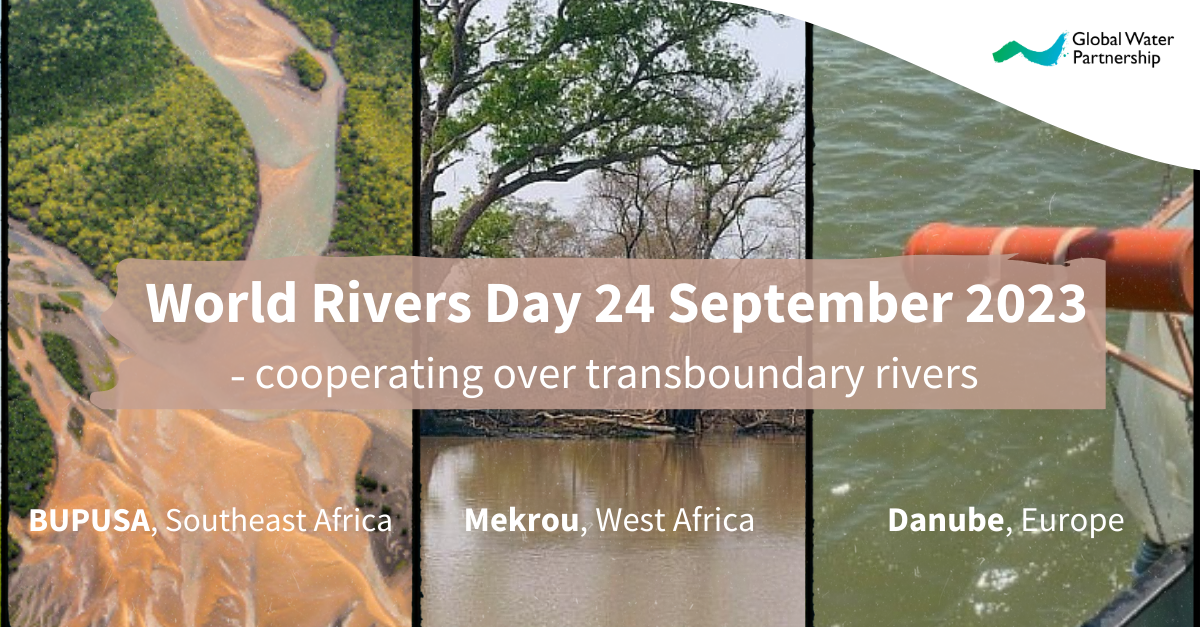Cooperation over transboundary rivers and further surface and groundwater is central to SDG target 6.5 and other SDG 6 targets. This World Rivers Day, we highlight GWP’s work with regards to stewardship of a number of transboundary river basins around the world.
BUPUSA: The Buzi, Pungwe, Save tri-basin project in Southeast Africa
The Buzi, Pungwe and Save River basins are shared by Mozambique and Zimbabwe. Water resources planning, development and management projects in the basins require the two countries to cooperate. GWP Southern Africa has managed several projects in the basin on behalf of the ministries responsible for water resources management in the governments of the two countries.
The 2018-2019 Buzi, Pungwe and Save (BUPUSA) Tri-basin Project had as its objective to strengthen cooperation and institution building created a ground for further collaboration.
Following several years of great collaboration, in May 2023, the BUPUSA Water Courses Commission Establishment Agreement was signed by the two countries’ Ministers of Water. The agreement allows for coordinated management, protection, and utilisation of the tri-basin and puts both countries in a better position to react to hazards such as floods, droughts, and cyclones.
The Mekrou River basin in West Africa
Over the past decade, GWP West Africa has been facilitating collaboration over the Mekrou river basin shared among Benin, Burkina Faso and Niger. GWP supported in developing the Mekrou Cooperation Framework Agreement that was signed in 2015.
Over the past few years, GWP worked with the Ministry of Water and Sanitation through the Permanent Secretariat of PANGIRE NIGER on the Mekrou River sub-basin that concerns the western part of the Dosso region and the south-western part of the Tillabery region in Niger.
Despite unforeseen challenges related to Covid-19, the collaboration led to numerous concrete outcomes. Amongst them are:
- The mapping of the actors of water resources management of the sub-basin of the Mekrou and its zone of influence in Niger
- The methodology for the elaboration of a territorial diagnosis and a Water Development and Management Plan (SAGE) that can be reproduced in Niger and in the West African sub-region
- The establishment of the Water Council of the sub-basin agency, in accordance with the guidelines of the PANGIRE Niger document. Read full story.
In 2022, GWP supported relevant stakeholders around the basin in developing an Integrated Water Resources Management Plan that, among other activities, entails teaching local communities and people to 1) produce and maintain seedlings to plant more trees and counteract deforestation, and 2) build efficient fireplaces so as to better control domestic energy consumption. Learn about the implementation of the plan.
A study on microplastic pollution in the Danube River, Europe
Microplastic pollution is a known issue in many rivers throughout the world, including the most international river basin in the world shared between 19 countries: The Danube river.
To pave the way for future remediation and prevention in Danube, Global Water Partnership Romania in collaboration with the More Green Association is taking important steps to evaluate the danger of microplastics in the river.
In 2022, 9 alluvium samples were collected (alluvium is a deposit of clay, silt, and sand left by flowing floodwater in a river valley or delta, typically producing fertile soil). The samples are being analysed to determine the amount of microplastic transported by the river to the Black Sea.
In continuation of the project, the team will investigate whether seasonal and weather changes affect the amounts of alluvium present in the river. Read full story.
Learn more about GWP’s work on transboundary waters.

